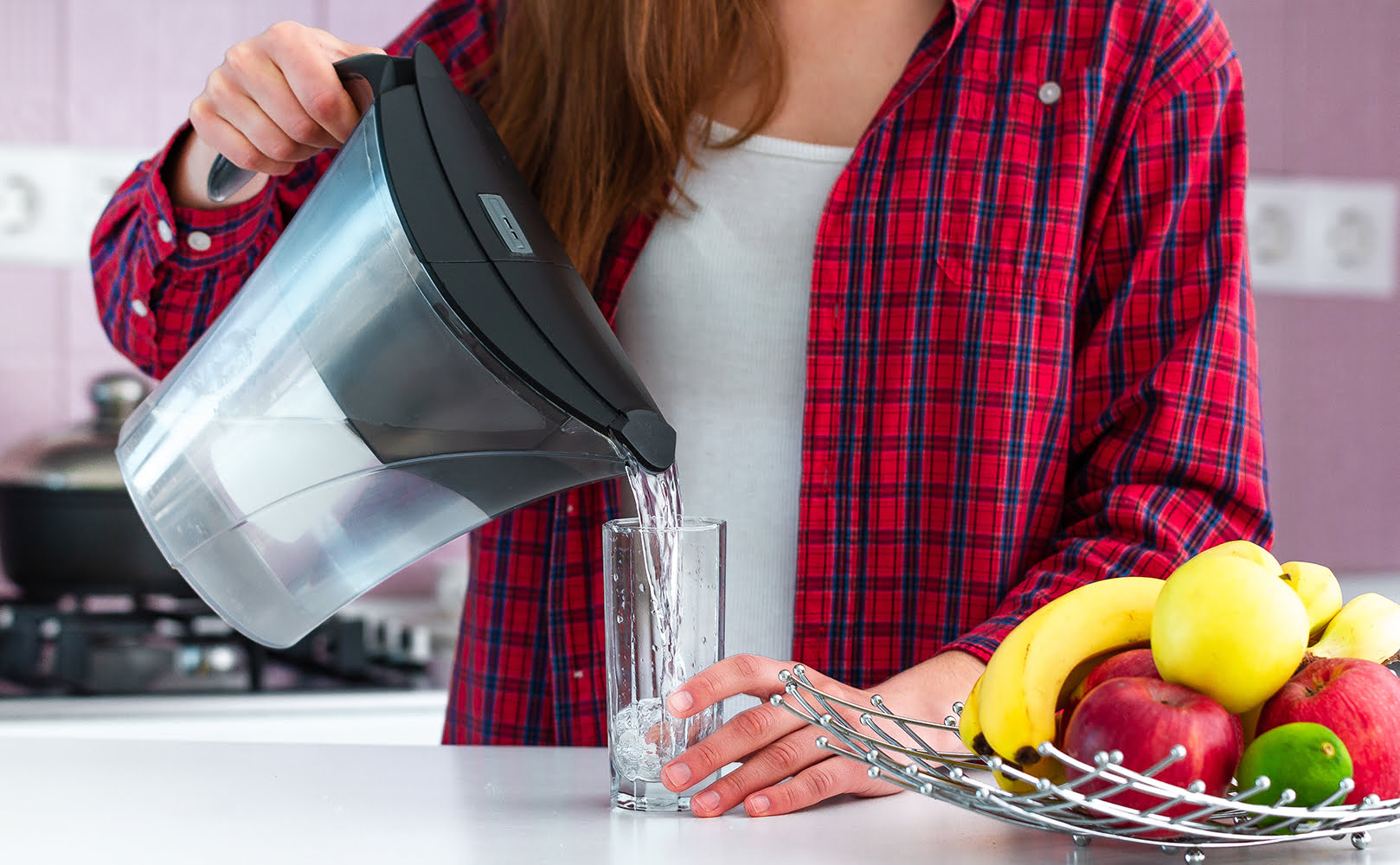Water Filter Pitcher vs Bottled Water: Which One Should You Pick?
Written by: Gene Fitzgerald // Last Updated: Jan 4, 2023
This page may contain affiliate links. If you buy a product or service through such a link we earn a commission at no extra cost to you. Learn more.
Are you sick of spending up to hundreds of dollars every month on bottled water? Or have you just had an intervention and want to live sustainably – sans plastic? In both scenarios, you must be on the hunt for an equally convenient and healthier alternative to bottled water.
Don’t worry; you are not alone! Many people in the US are now ditching plastic bottles and switching to residential water filtration systems. Today, we talk about the easiest method of achieving filtered water at home: Water filter pitchers. But how efficient are these portable water filters, and are they worth the shift from bottled water?
Keep reading to find out.
Key Takeaways
- Water filter pitchers are practical, fuss-free, and environment-friendly appliances that fulfill your most basic need: providing safe and clean drinking water.
- Bottled water will cost you more and contributes to plastic pollution. It also has a much larger carbon footprint.
- We would definitely recommend investing in a good water filter pitcher than to keep buying bottled water.
What Is a Water Filter Pitcher?
Water filter pitchers refer to pitchers/jugs with a small inbuilt filter cartridge. When you pour water from the top, it passes through a filter elements and collects in a reservoir at the bottom. The filtration process takes approximately ten to thirty minutes.
But the real question is, what contaminants do water filter pitchers remove? Well, there’s no definite answer since all pitchers are not made alike. With that said, as long your water does not contain a lot of hard-to-remove contaminants, most filter pitchers do an excellent job at making water safe.
Some use a coconut-based activated carbon filter that removes chlorine, chemicals and even some heavy metals. In comparison, others feature sophisticated multi-stage treatment, including ion exchange resin and ceramic filtration. The latter offers meticulous contaminant removal with some water filter pitcher models being able to remove more than 200 harmful contaminants, resulting in pristine, refreshing and safe drinking water.
When it comes to water filter pitchers, expensive is not always best. Instead, you must look for high-quality ones that boast NSF certifications and have good reviews. In our opinion, the #1 water filter pitcher on the market right now is the Clearly Filtered. Aquagear and models by Epic Water Filters are good, too.
What Is Bottled Water?
Judging by statistics, bottled water is perhaps the most favorite beverage amongst Americans.
In fact, the US is the biggest consumer market for bottled water globally, crossing over 14.4 billion gallons in volume in 2019. Costing 300 times more per gallon compared to its tap equivalent, though, bottled water sales are nothing but alarming.
Besides, more than ¼ of all bottled water is actually tap water filled from a municipal source. Yes, the water bottle that is resting in your fridge does not necessarily come from a natural spring. It was, perhaps, simply collected from another source/tap and possibly treated before being bottled.
Types of Bottled Water
Before we go further, let’s go through the different types of bottled water. Please note that the FDA binds all bottled water manufacturers to clearly print the “type” of water on the label.
- Spring Water: Spring water is claimed to be packaged right where it flows from, i.e., natural springs.
- Purified Water: Purified water usually refers to as water that has been filtered or processed to remove harmful contaminants. The source is usually groundwater or tap water.
- Mineral Water: Pulled from a mineral spring, the water is chock full of essential minerals like magnesium, calcium and potassium.
- Sparkling Bottled Water: Also known as carbonated water, soda water, seltzer, and tonic water, sparkling water is infused with carbon dioxide to make lots and lots of bubbles (fizziness).
- Artesian Well Water: Artesian well water is sourced from an underground aquifer, a porous layer of geological rocks.
Evidently, the bottled water market is huge, but is it regulated? You’d be surprised to know that industry regulations for tap water are stricter than for bottled water. In all honesty, water that flows through your taps faces more rigorous scrutiny than that flows out of the bottle you paid 300 times more for.
Yet again, not all bottled water is the same as you can tell from the above list. Some types of bottled water like mineral water and artesian well water are generally safer and healthier to drink than regular tap water. Regardless of how popular bottled water is, it adds up the cost to your wallet and the environment fairly quickly.
Pros of Pitcher-Filtered Drinking Water
Are you still perplexed? Here we weigh the pros and cons of both filter pitchers and bottled water. Let’s get rolling.
We shall begin with the benefits of using water filter pitchers.
Pristine Taste & Smell
If you have ever had a sip of water from a mountain spring, you’d know pure water tastes amazing. It can literally get you hooked.
With a good quality filtered water pitcher, you can expect the same refreshing pure taste 24/7 in the comfort of your home. Carbon-based filters are exceptional at removing foul odors and unpleasant tastes from your water so that you can taste pure H2O.
Filtered Water Can Be Healthy
Apart from the amazing taste and smell, filtered water has numerous health benefits. Your family is shielded from many illnesses when your water is free from chlorine, lead, chromium, pesticides – you name it.
Depending on the quality of water flowing through your home, however, you need a highly potent water filter pitcher if you want to achieve a certain level of purity.
Moreover, these filters ensure essential minerals like magnesium and calcium to remain in the filtered water.
By the way, most pediatricians strictly advise using tap water for kids due to potential bacterial overgrowth in bottled water.
Affordability
Water filter pitchers are the most inexpensive filtration option. Bottled water costs approximately $9.60 per gallon. In comparison, tap water costs pennies on the dollar.
A water filter pitcher may cost approx $20-50. Even with regular filter replacements, they are much cheaper than buying packaged water.
Water on Demand
In case of water crisis or any other emergency like the Covid-19 outbreak, when most people begin to stockpile bottled water, you will be at peace knowing you have an endless supply of pure water right in your kitchen.
Sustainability
Filter pitchers are nifty appliances that prove you don’t need to create tons of waste to get filtered water. Most units last you a couple of years and create barely any waste at all. You owe that much to the planet, don’t you?
Moreover, some pitchers now feature eco-friendly activated charcoal sticks made out of wood. Each lasts for six months, and once spent, you can just break it up and use it as compost for your plants.
Cons of Pitcher-Filtered Drinking Water
Here are a few disadvantages associated with filter water pitchers.
Filter Replacements
You must change the filter cartridge of your pitcher every one to three months, depending on the usage. Honestly, it can get tedious after a while. Some people also forget to change the filter at the required time and continue using substandard water – realizing too late when the damage has already been done.
Long-Term Cost
Water filter pitchers are a practical and inexpensive piece of equipment. However, the replacement cartridges’ cost can become high if you use an expensive one. The price for cartridge replacements can range between $4 to $15 a month and add up quickly if you have a big family.
Pros of Bottled Water
Here are the reasons why many people still prefer splurging out money on bottled water.
Convenience
Readily available and highly convenient, most people don’t think twice before adding bottled water to their grocery bag and sipping it on the way to their car. This is why the smallest size of packaged water bottles sales are highest.
Can Be Safer to Drink than Tap/Filtered Water
As long as the water is sourced from a reliable source, bottled water can be healthier to drink than filtered tap or well water.
Can Taste Good
Bottled water tastes different from tap water. Some find it pleasant; others, not so much. It is somewhat surprising that some brands of bottled water taste incredibly nasty. This could be due to plastic leaching in the water or just the initial treatment of water.
Cons of Bottled Water
We could go on and on, but here are a few of the most significant disadvantages of bottled water.
Ethical Implications
According to law, bottled water does not need to state where the water was sourced from.
So if you buy a bottle of Poland Spring, it does not necessarily mean the water was filled from a spring in Poland. It might just be spring water sourced somewhere in the US.
Also, in reality, only 55% of bottled water in the US comes from springs. The rest, 45%, is filtered groundwater or surface water.
People just don’t have a clue since most companies are very cagey about revealing their sources. We also know for a fact that big companies buy water from corrupt governments just to keep their businesses running – sadly at the cost of the local public.
Environmental
We all know what plastic waste is doing to our planet. Bottled water creates thousands of tons of garbage each year, garbage that will take hundreds of years to disintegrate. Unfortunately, even the ones that make it to the recycling pile are almost as problematic.
It’s a selective and exhaustive process where the plastic very often deteriorates beyond usage. Not to forget, each gallon of bottled water wastes an equal or more amount of water during the packaging and distribution process. Undoubtedly, the carbon footprint of the entire process is even more dreadful.
Moreover, many bottled waters come from groundwater in the most drought-ridden places in the country, including California. It’s simply where bottlers have set up their plants.
Cost
Bottled water is expensive. Period. Not only is it 300 times more costly than normal tap water, but it also costs 2x more than gasoline. When you compare the yearly costs of using packaged water, it is way higher than using water filter pitchers that offer the same convenience and utility.
Chemicals Leaching into Your Water
Most packaged water comes in plastic bottles. Plastic can leach a tiny amount of chemicals into the product it holds. The longer the water stays in the bottle, and the higher the temperature goes, the faster the chemical bonds of the plastic begin to break down.
BPA, a chemical contained in many plastics, is linked with cardiovascular disease and diabetes. It could also lead to reproductive problems.
Water Filter Pitcher vs Bottled Water: Conclusion
Water filter pitchers are practical, fuss-free and environment-friendly appliances that fulfill your most basic need: fresh, safe filtered water. On the other hand, bottled waters are draining a hole in your pocket and hurting Mother Nature.
The decision is simple: Team water filter pitcher all the way!
If you have any questions about water filter pitchers vs bottled water please don’t hesitate to leave a comment below!
Information provided on BOS is for educational purposes only. The products and services we review may not be right for your individual circumstances.
We adhere to strict editorial guidelines. Rest assured, the opinions expressed have not been provided, reviewed, or otherwise endorsed by our partners – they are unbiased, independent, and the author’s alone. Our licensed experts fact-check all content for accuracy. It is accurate as of the date posted and to the best of our knowledge.




